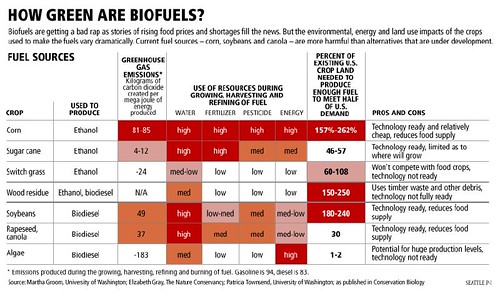Biofuels Get a Boost – Secretary Chu Announces Nearly $800 Million from Recovery Act to Accelerate Biofuels Research and Commercialization
(Source: GreenBiz via Reuters)

The Obama administration established a Biofuels Interagency Working Group this week in a move that carries implications for the industry on several fronts, including regulatory and research and development.

The Biofuels Interagency Working Group, comprised of the U.S. Environmental Protection Agency, Department of Energy (DOE) and Department of Agriculture, will develop a biofuel market development program, coordinate biofuel infrastructure policies, study biofuel lifecycle and help existing biofuel producers secure credit and refinancing.
Meanwhile, the DOE will spend $786.5 million in stimulus funds on demonstration projects and research to accelerate the adoption of next-generation biofuels.
For example, the agency will dole out $480 million on 10 to 20 pilot-scale and demonstration-scale projects, with a ceiling of $25 million and $50 million, respectively. Another $176.5 million shall be used to increase funding for two or more commercial-scale biorefinery projects that previously received government assistance.
The DOE biomass program also will dedicate $130 million toward research into ethanol, algal biofuels and biofuel sustainability research.
The proposal breaks down renewable fuels into four categories: cellulosic biofuels, biomass-derived diesel, advanced biofuels, and total renewable fuel. The fuels must produce fewer greenhouse gas emissions than conventional fuels, but there is great debate within the biofuel industry about how these lifecycle assessments should be calculated.
$480 million solicitation for integrated pilot- and demonstration-scale biorefineries
Projects selected under this Funding Opportunity Announcement will work to validate integrated biorefinery technologies that produce advanced biofuels, bioproducts, and heat and power in an integrated system, thus enabling private financing of commercial-scale replications.
DOE anticipates making 10 to 20 awards for refineries at various scales and designs, all to be operational in the next three years. The DOE funding ceiling is $25 million for pilot-scale projects and $50 million for demonstration scale projects.
These integrated biorefineries will reduce dependence on petroleum-based transportation fuels and chemicals. They will also facilitate the development of an “advanced biofuels” industry to meet the federal Renewable Fuel Standards.
$176.5 million for commercial-scale biorefinery projects
$176.5 million will be used to increase the federal funding ceiling on two or more demonstration- or commercial-scale biorefinery projects that were selected and awarded within the last two years.
The goal of these efforts is to reduce the risk of the development and deployment of these first-of-a-kind operations. These funds are expected to expedite the construction phase of these projects and ultimately accelerate the timeline for start up and commissioning.
$110 million for fundamental research in key program areas
The Biomass Program plans to use $110 million to support fundamental research in key program areas, distributed in the following manner:
- Expand the resources available for sustainability research through the Office of Science Bioenergy Research Centers and establish a user-facility/small-scale integrated pilot plant ($25 million);
- Create an advanced research consortium to develop technologies and facilitate subsequent demonstration of infrastructure-compatible biofuels through a competitive solicitation ($35 million); and
- Create an algal biofuels consortium to accelerate demonstration of algal biofuels through a competitive solicitation ($50 million).
This funding will help to develop cutting-edge conversion technologies, including generating more desirable catalysts, fuel-producing microbes, and feedstocks.
$20 million for ethanol research
The Biomass Program is planning to use $20 million of the Recovery Act funding in a competitive solicitation to achieve the following:
- Optimize flex-fuel vehicles operating on high octane E85 fuel (85 percent ethanol, 15 percent gasoline blend);
- Evaluate the impact of higher ethanol blends in conventional vehicles; and
- Upgrade existing refueling infrastructure to be compatible with fuels up to E85.
Click here to read the entire Reuters report.
